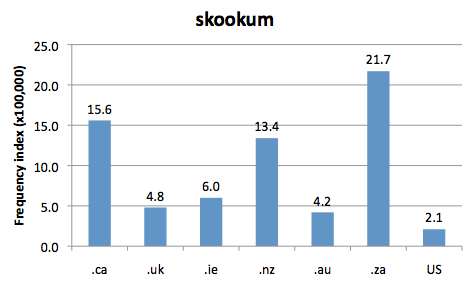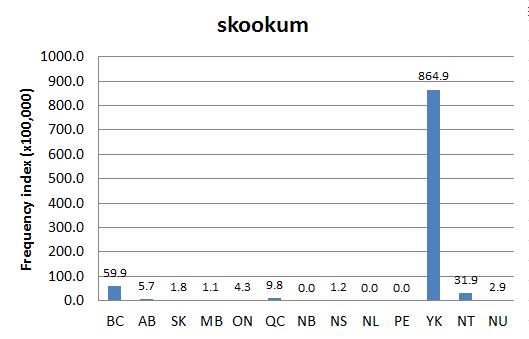DCHP-2
skookum [< Chinook Jargon < Chahalis skukm] DCHP-2 (December 2016)
1 adj. — rural, slang, Yukon, rare in British Columbia and the Northwest Territories
good, great, strong, big or brave.
Type: 4. Culturally Significant — Skookum is a lexical transfer from Chinook Jargon, a contact language that was used on the Canadian west coast and the US Pacific Northwest Coast as a trade language. The language, used as a lingua franca, fell into disuse beginning in the early 20th century. DARE (s.v. "skookum" adj.) lists its earliest quotations from 1847 (Oregon glossary) and from a magazine in 1894. We label it, due to the American antedating, "Culturally Significant" because of the important role that Chinook played on the 19th-century west coast.
Chart 1 does not replicate this western Canadian and US Pacific Northwest prevalence, as travel sites in South Africa (.za) and New Zealand often refer to place names and restaurants in Canada/US. Chart 2, however, shows that the term is most vibrant in the Yukon Territory today, followed by British Columbia and the Northwest Territories. In the former, only people with extensive rural connections continue to use the term (see Gregg 1995).
Skookum is one of several terms that transferred into English that is largely, but not exclusively, used by an older demographic (see Canadian Encyclopedia reference on the use of Chinook Jargon for some background). Evidence from the sociolinguistic Survey of Vancouver English, outlined in Gregg (1995: 186), shows that the term is more prevalent among men than women.See also: Chinook Jargon hyiu hyiu-skookum skookumchuck skookum tumtum saltchuck
2 adv. — used as an intensifier, obsolete
very, strongly.
Type: 4. Culturally Significant — The use as an intensifier is (or rather was) comparatively rare when compared with the adjectival uses in meaning 1. This function might be "Origin", yet is, by any rate, culturally significant as a result of the relevance of Chinook in early British Columbia and the Yukon.References:
- Canadian Encyclopedia s.v. "Chinook Wawa" Accessed 31 May 2016
- DARE
- Gregg (1995)
Images:

Chart 1: Internet Domain Search, 20 Apr. 2016
Chart 2: Regional Domain Search, 26 Jun. 2016
